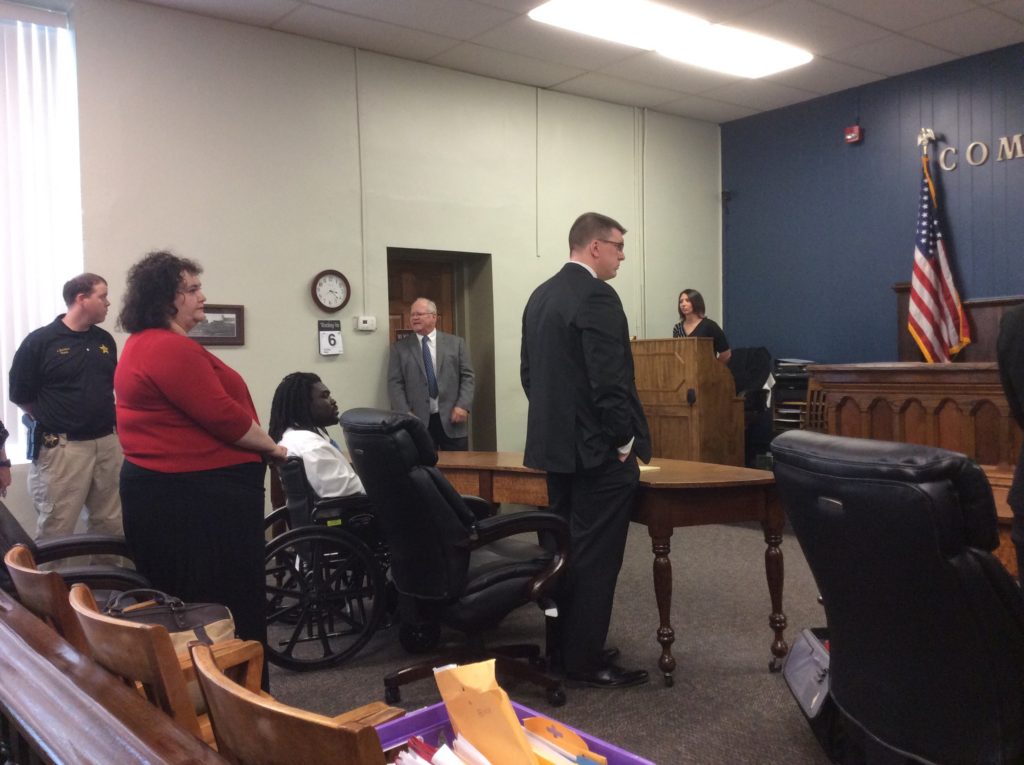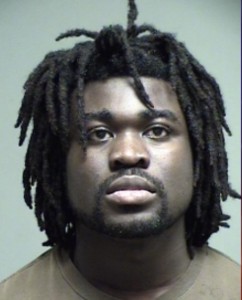Daboni found guilty on all counts by Meigs County jury

Jacques Daboni awaits the verdict while his attorneys stand for the jury to enter the courtroom. Daboni was found guilty on all counts. Photo by Carrie Gloeckner.

POMEROY – A Columbus man has been convicted on all counts by a Meigs County jury Friday.
Jacques Georges Daboni, 25, was charged with felony counts of trafficking in heroin following his arrest and a raid on a house in Racine in September 2014. Daboin has numerous charges related to various dates and were merged into one for the trial. His charges are in case 14-CR-173: three felony counts of trafficking heroin in the fifth degree; one felony count in the first degree of possession of drugs; one felony count in the first degree engaging in a pattern of corrupt activity. His charges in case 14-CR-232: two felony counts in the fourth degree of trafficking in heroin; two felony counts of trafficking heroin in the fifth degree; and one felony count trafficking heroin in the second degree. In case 15-CR-23 he is charged with one felony count of engaging in a pattern of corrupt activity in the second degree. The jury found him guilty on every charge.
Daboni has gone through several attorneys, an alleged injury which allegedly occurred while he was in custody and a previous mistrial because of the alleged injury. He also faces similar charges in other counties.

Throughout the trial the picture of how much heroin was moving through not just Meigs County, but the village of Racine. Areas such as Bashan Road, and along the road near the Diddle’s farm, the post office, Tanners Run, Dollar General parking lot, park and ride at Racine, and other locations were meeting spots for drug exchanges. The business of selling heroin became clearer and business was good for a supplier like Daboni.
The trial began Monday May 2, 2016 in the Meigs County Common Pleas Court following jury selection.
Day One
Most of the day was taken up with jury selection. The jury was admonished by Judge I. Carson Crow with instructions which included staying away from various media outlets including staying off of the internet while serving during the trial. The jury received instructions regarding opening statements as well.
Opening statements were presented by the prosecution from assistant prosecuting attorney, Jeremy Fisher.
“ The evidence in the case is about a drug dealer that set up shop in Racine,” Fisher opened with the jury.
Defense attorney, Jason Holdren, maintained the burden of proof falls on the state as he made his opening statements to the jury.
Following opening statements, the jury was dismissed and again admonished by Judge Crow.
Day Two
The trial started off with one witness giving testimony for about 15 minutes when a recess was called. Holdren asked for a mistrial which was denied by Judge Crow.
The trial resumed with Bill Gilkey, director of the Major Crimes Task Force of Gallia and Meigs Counties, explaining the process of controlled buys to the jury. The process of using informants was also explained. The use of the Ohio Bureau of Criminal Investigations (B.C.I.) and the process of their testing alleged drugs and drug materials was also presented.
Alleged drug deals just off US 33 on Bashan Road, the parking lot of Dollar General in Racine and other locations in the village of Racine were presented to the jury.
Director Gilkey, went through his experience of 21 years in law enforcement and seven years specifically dealing with investigating drug activity. He said that at the time, a gram of heroin was going on the street for $240 a gram in the area. A tenth of a gram was selling for $30 to $40 and by piecing out the gram, anyone dealing it could make $160 more than selling an entire gram.
Several dates were discussed as Fisher would play a short introductory piece of various tapes that are recordings of agents in the process of an alleged controlled buy. As the agent explained who was on the tape, including himself, numerous evidence bags were also brought out all were containing heroin allegedly purchased in the various buys.
Holdren objected several times for the agent to testify to his personal experience.
Over and over again other names came up in the discussion, but not Daboni.
After the lunch break Holdren began the cross examination of Gilkey. Holdren methodically went through each instance pointing out that during the alleged deals, Daboni was not present nor was he mentioned in any of the logs regarding the controlled buys.
Holdren went back through all of the testimony previously given from Gilkey. Holdren asked about the reactions given by various individuals that Gilkey had testified to was not actually witnessed by Gilkey. The director said yes, that he had not directly witnessed it.
Holdren asked him to speak directly on what he had personally witnessed. Gilkey complied, and talked about a controlled buy he witnessed at the intersection on Oak Grove Road in Racine. Again, Daboni was not a part of the controlled buy. Holdren asked about the pictures shown to the jury and asked if they may not have anything to do with the case.
“It’s possible,” Gilkey said.
Following an approach to the Gilkey’s testimony, the jury was excused from the courtroom and Holdren again asked for a mistrial. Holdren argued that on day two of the trial the prosecution was still trying to get it’s case together and discovery was not complete. Holdren specifically questioned the weight show on one of the photographs as not being a part of discovery.
“It’s day two of the trial, not the time to do this,” Holdren said while the prosecution searched documentation to clarify the evidence.
“What are we doing,” Judge Crow said to the prosecution, referencing them throwing the pictures up on the screen for the jury.
“If what has happened today is not grounds for a mistrial. I don’t know what is,” Holdren argued, but Judge Crow denied the motion stating he would take it under advisement.
The jury was brought back in and testimony continued. The state called numerous experts from the Ohio BCI, having tested, weighed and examined the heroin purchased through controlled buys. Williams and Fisher went through the process with the photographing evidence with Gilkey and other law enforcement involved with the case to clarify the photographs used.
During cross examination, some labeling mistakes or irregularities were noted by the defense.
After the jury was dismissed for the day, the attorneys continued to argue out the issue with the photographs and labeling.
“I’ve never heard of anything like this,” Holdren said, adding it bears on everything involved in creating a defense or appeals for his client.
“It’s kind of like a circus,” he said.
“There isn’t an issue with what we’ve done,” Williams said.
Holdren also addressed the issue with his client being seen in a jail uniform verses plain clothes by the jury. A plan was set in place to make sure that did not happen.
Judge Crow said he was taking everything under advisement and they were to start again at 9:15 a.m. on Wednesday.
Day Three
Before the jury was brought in to the courtroom, Holdren again addressed the issue with jurors seeing his client in jail jumpsuit. According to Holdren, a couple of the jury witnessed Daboni in jail uniform the previous day. Holdren acknowledged he did not believe it was intentional, but it could bias the jury against his client.
The state began with calling Jay Proffitt to the stand. Proffitt testified to Daboni having two Rottweilers next door to Proffitt’s home. He said there had been an incident with the dogs being loose and Proffitt had concern about his son being harmed by the dogs. Proffitt said he talked to Daboni about the dogs and was invited into the house to talk about it, which he did. Proffitt said the dogs were aggressive.
The dogs were there about a month and moved to Chad Diddle’s parents home.
Proffitt also testified there had been an unidentified woman that came to the house, was greeted by Daboni. The two were in the home for a while and when the woman exited the house seemed to barely be able to function.

On cross examination, Proffitt even stated that he a video of the woman, but that was not entered into evidence from the state. The attorneys approached the bench. It was not viewed.
Testimony continued and Proffitt said he saw Diddle coming and going as if he was running errands a lot. He also said he saw Teddy Brown doing the same thing. The home was owned at the time by Diddle. Diddle owned the house.
Following Proffitt, members of the Major Crimes Task Force with Meigs and Gallia counties testified to the procedure evidence was gathered and the way confidential informants were used in the case.
Forensic experts from Ohio BCI also gave testimony about the paperwork, process, labeling and testing of materials submitted to them in regard to the case.
Amber Duffy took the stand and quietly answered questions. Her testimony pointed to Daboni as the person in charge of the ring. Duffy detailed her roll of running drugs and selling drugs for Daboni. She received a half gram of heroin in exchange for her work. Duffy was living in the house with Diddle at one point.
Duffy had entered into a plea agreement with the state in exchange for her testimony. According to the agreement, she served six months in jail and six months in a residential locked down drug treatment facility. She is also subject to community control. Duffy has final sentencing coming up as well.
“Chad and I were always there. Jacques would come and go,” she said. As she testified the picture became clearer of Daboni being the supplier with Diddle and Duffy being runners, taking that supply to customers. As she continued the sheer volume of heroin business in the county became clearer as well.
At that time, a gram of heroin was going for $240 a gram. If it was cut down into tenths, it sold for more. Duffy said she could sell the heroin quickly with all of the money going to Daboni. Daboni had her set up the electric in his name so his name would not appear to be connected with house.
On cross examination, Daboni’s attorney questioned Duffy’s motives given her admitted criminal activity. Holdren defended his client and worked to try to discredit her testimony, as a self-proclaimed, “full blown heroin dealer, regularly trafficking in heroin.”
Day Four
The started with Chad Diddle taking the stand. Diddle outlined his involvement with the illicit business. He became more involved when Duffy began to have a falling out with Daboni over money. Diddle worked for a half gram of heroin a day. He said he would shoot up first thing in the morning, make run orders for heroin until around midday when he would shoot up again. By 10 p.m. he would generally end out his day with heroin again, but in the meantime he had been working hard at selling heroin for Daboni. It was all for that half gram of heroin he would use.
All money collected was turned over to Daboni, both Diddle and Duffy said that on the witness stand repeatedly. Both also testified that while they were using heroin, Daboni never did.

Diddle admitted to being able to sell 15 to 16 grams of heroin a day in Racine which is about $3,500 a day in sales. He said buyers that were outside of Meigs County had another price. West Virginia buyers were charged $30 more for a gram and $10 more for a tenth of a gram.
“West Virginia pays more for product,” Diddle said.
On cross examination, Holdren pointed out that Diddle was “no stranger to law enforcement” with his record. Without the plea agreement, Diddle was looking at more than 11 years in prison. Diddle remained composed during the cross examination as Holdren listed his numerous offenses and the circumstances of Diddle’s eventual arrest by law enforcement.
Diddle said he started selling drugs to support his drug habit and Daboni received all of the proceeds from the sales. In a day, Diddle could easily sell in excess of $3,600 of heroin for Daboni.
An agent with the task force took the stand and went over the procedures again. The testing of materials, paperwork, logs and process was again explained with specific evidence noted in that process.
Fisher recalled Diddle later in the day and asked him to identify a voice heard on a recorded controlled buy of heroin. Diddle identified the voice as being Daboni.
Jeremy Burgess of Ravenswood, W.V., was next to take the stand. Burgess was arrested when the raid at 303 Fifth Street in Racine back in September 2014. Burgess soon entered into a plea agreement and was the first to cooperate with law enforcement. Burgess’ deal involves only a possession misdemeanor.
Of the raid, Burgess said it was “the most traumatic day of my life.”
Burgess told the story of his use and need for more heroin. He was unable to pay for his habit and like Duffy and Diddle, began to work for Daboni in exchange for a half gram of heroin. He was selling up to five grams of heroin at a time. He would give the money to Diddle and Diddle would give the money to Daboni.
During the raid, Burgess’ phone was confiscated. He read through his texts at the direction of Fisher. Fisher asked him to read text after text that fit the pieces together of addiction and business. It was addiction for Burgess and pure business for Daboni. Burgess’ texts included him asking for the favor from Diddle to “spot me one” referring to heroin. Diddle had replied Burgess had to pay. He considered Diddle a good friend and thanked him for helping him as he had with gaining heroin. Burgess wanted to be more and more involved to earn more and more heroin. Burgess considered Daboni a “good friend” and so much so that Daboni was willing to give him his drug free urine to allow Burgess to pass a drug test for a job he was applying for in Ravenswood.
Teddy Brown and his involvement in the drug ring was also repeated as Brown was another runner and assisted in driving the others to places as he had a driver’s license and many of them did not.
Burgess read through texts that included a buy one, get one sale on heroin. If someone bought a tenth, they received a tenth free and so forth. Burgess worked as the others did. He had to ask permission of “the boss” (Daboni) to be able to use a few dollars of the money he was collecting for gas to make the deliveries or even to buy something to drink.
Burgess even met Daboni at a Speedway in Lancaster, Ohio to give him money and bring a new shipment of heroin back to Meigs County.
Day Five
Following meetings between the attorneys and Judge Crow, the jury returned to the courtroom. The prosecution rest their case. The defense did not call witnesses or have further evidence.
The jury heard both Holdren and Fisher give closing arguments before having a lengthy explanation of instructions from Judge Crow. The jury left the courtroom to deliberate at 11:21 a.m. and returned to the courtroom about 3:15 p.m. with the guilty verdict on all counts for Daboni.
The courtroom was quiet as Judge Crow read the verdict in each count. Daboni was quiet, but seemed to be unmoved at each guilty verdict the judge read.
Daboni will be sentenced by Judge Crow on Tuesday in the Meigs County Common Pleas Courtroom.






